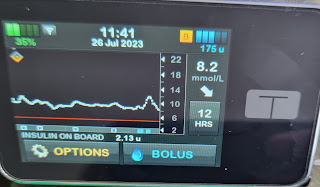Tuesday, October 24, 2023
I Was Feeling Complicated...
Thursday, October 19, 2023
The Power Of Sharing
In the world of diabetes management, every day brings unique challenges. Yet, through the power of advocacy and awareness, individuals with diabetes are finding the strength to face these challenges head-on. This blog post revolves around a compelling story shared to me by an online diabetes peer, which beautifully encapsulates the impact of diabetes advocacy and the resilience of those living with the condition.
Our peer shared a moment from their life that unfolded during a seminar. It was a day like any other, but their insulin pump had other plans. It malfunctioned, resulting in high glucose levels—a situation that can be unsettling for anyone. Instead of feeling embarrassed, this individual demonstrated remarkable composure. They calmly injected insulin and replaced their pump set right there in the room, without leaving or excusing themselves. In their own words, they did it "like it's a normal thing...which it is apart from injecting."
Here is their message, shared with permission:
This story carries a profound message, not just for people with diabetes but for everyone:
The Power of Advocacy: The online diabetes community, along with dedicated advocates, has played a pivotal role in raising awareness about diabetes. Their efforts have contributed to a more informed and understanding society, allowing individuals like our peer to feel supported and empowered.
Breaking Down Stigmas: Our peer's ability to manage their diabetes openly and confidently challenges the stigmas surrounding the condition. It exemplifies that dealing with diabetes, even in unconventional situations, should be normalised and accepted.
Self-Empowerment: This story is a testament to the resilience and self-empowerment that individuals with diabetes can cultivate. When people understand that diabetes is a part of life but doesn't define it, they can confidently manage it without feeling the need to hide.
Inspiration to Others: The courage displayed by our peer serves as an inspiration to me and I hope others in the diabetes community. It shows that unpredictable moments can be met with grace and that diabetes doesn't have to hold anyone back.
The Importance of Preparedness: While managing diabetes is a day-to-day reality, moments like the one our peer experienced highlight the importance of preparedness. Knowing how to handle such situations and sharing this knowledge can benefit the entire community.
This story is a testament to the transformative power of diabetes advocacy and the resilience of those living with the condition. Through advocacy, we can break down stigmas, inspire self-empowerment, and encourage a sense of normalcy in managing diabetes. Our peer's experience during that seminar is proof that, with the right support and awareness, individuals with diabetes can confidently navigate even the most unexpected moments with confidence, ensuring that diabetes doesn't define them, but rather, becomes just another part of their remarkable lives.
I talk about my diabetes a lot and I do that simply to share my experiences. Remarkably, that simple act can have a hugely positive impact on others. I strongly encourage you, reader, to share your own experiences about diabetes.
If you enjoyed this blog and you'd like to support me over the time that I give to others, my online content, or if you'd like some direct support from me then check out these links:
BUY DIABETIC DAD A COFFEE HERE
GET MENTORING SUPPORT FROM DIABETIC DAD
Prefer PayPal?
Monday, August 28, 2023
Hybrid Closed Loop - My Thoughts
BUY DIABETIC DAD A COFFEE HERE
GET MENTORING SUPPORT FROM DIABETIC DAD
Prefer PayPal?
Friday, August 11, 2023
The Blue Tick
• Credibility Amplification: Whether we like it or not, for many, verification on Twitter symbolises authenticity and credibility. For diabetes advocates, whose primary goal is to provide accurate information and create awareness, being verified adds an extra layer of trust for their followers. Verified accounts are perceived as authoritative sources of information, allowing advocates to spread accurate details about diabetes management, treatment options, and lifestyle changes with more impact.
• Enhanced Visibility: Verified accounts are more likely to appear at the top of search results and in relevant conversations. For diabetes advocates, this visibility boost is essential in ensuring their messages reach a broader audience. With the ever-increasing volume of content on social media, standing out from the noise is crucial. Verification ensures that the important messages of diabetes advocates are not lost in the crowd, enabling them to effectively reach people who need accurate information about the condition.
• Access to Features: Twitter verification comes with access to advanced features, such as analytics and insights into tweet performance. This data can be incredibly valuable for diabetes advocates, as it helps them understand what type of content resonates most with their audience. This information can be used to tailor their advocacy efforts, refine their messaging, and optimise their engagement strategies.
• Collaboration Opportunities: Verified accounts are more likely to be approached for collaborations, partnerships, and joint initiatives. For diabetes advocates, this means increased opportunities to collaborate with medical professionals, researchers, organisations, and other "influencers" in the healthcare space. Collaborations can lead to more comprehensive and impactful advocacy campaigns, furthering the cause of diabetes awareness.
• Building a Stronger Community: Verification status fosters a sense of community among advocates, creating a network of credible voices in the diabetes space. Verified advocates can connect more easily with each other, sharing insights, experiences, and strategies. This sense of camaraderie strengthens the overall impact of their advocacy efforts and encourages the exchange of knowledge within the diabetes community.
• Countering Misinformation: This is one of the major pulls for me to be verified. Diabetes advocates often find themselves combating misinformation and myths about the condition. A verified status on Twitter empowers advocates to debunk false information with authority and credibility. As misinformation spreads easily on social media, having verified advocates actively participating in these discussions is essential for steering the conversation in the right direction.
In a world where social media has become an integral part of advocacy, Twitter verification holds undeniable significance for diabetes advocates. The benefits range from amplifying credibility and visibility to enabling collaboration and providing access to valuable insights. By becoming verified, diabetes advocates can leverage their status to create a more informed, connected, and empowered diabetes community. As the digital landscape continues to evolve, being verified on Twitter is not just a badge of honour; it's a tool that can drive meaningful change and make a lasting impact on diabetes awareness.
BUY DIABETIC DAD A COFFEE HERE
GET MENTORING SUPPORT FROM DIABETIC DAD
Prefer PayPal?
Wednesday, July 26, 2023
Keep Me In The Loop
BUY DIABETIC DAD A COFFEE HERE
GET MENTORING SUPPORT FROM DIABETIC DAD
Prefer PayPal?
Sunday, July 9, 2023
Combating Stigma in Diabetes Online Content
In today's digital world, the internet has become a significant source of information and support for individuals with chronic conditions such as diabetes. However, despite its many advantages, the online sphere is not immune to the perpetuation of stigma and misinformation surrounding the condition. You may have read a lot about stigma via your social media platforms of late. I apologise if my own content has been focused on that subject. However, I do believe it is a hugely important issue and one which can be addressed within the general population. I understand that to many of you stigma is not the most exciting subject to read about. Indeed, some of you may have never experienced stigmatising content. Stick with me, have a read, it will only take a few minutes.
Stigmatising content can have severe consequences for individuals with diabetes. It not only perpetuates harmful stereotypes but also hinders our ability to manage the condition effectively. Stigma may discourage individuals from seeking necessary medical care, adhering to treatment plans, or even disclosing their condition to others. Consequently, this can lead to poor glycemic control, increased complications, and a diminished quality of life.
To combat stigma effectively, it is crucial to empower individuals with diabetes through education and awareness. Creating and promoting online content that accurately represents the realities of living with diabetes can play a pivotal role in challenging misconceptions and dispelling stereotypes. At #GBDoc, we recently launched the #StopTheStigma campaign to do precisely that. By providing evidence-based information, sharing personal experiences, and embracing empathy towards others, we can reshape the narrative around diabetes and create a more inclusive online environment.
Online communities such as GBDoc can serve as a lifeline for individuals with diabetes, offering support, validation, and a sense of belonging. These communities should prioritise the creation of safe spaces that are free from stigma and judgement. As a volunteer, I work hard to ensure everybody feels safe to engage in and express themselves in the communities that I am a part of. If you notice or experience otherwise, just let me know.
Healthcare professionals CAN play a crucial role in combating stigma surrounding diabetes. By staying updated on the latest research, guidelines, and treatments, they can provide accurate information to their patients and the general public. Sadly, there are some HCPs with a different agenda. I strongly encourage diabetics of any type to avoid engaging with or acknowledging HCPs who are promoting diets or lifestyles via a subscription based service. There are a few of those guys kicking around, even in the UK!
Despite it being 2023 and despite many words of advice and correction, stigma surrounding diabetes persists in online content today, creating barriers for individuals seeking support and information. However, by recognising the impact of stigma and actively working to combat it, we can create a more inclusive and supportive online environment for individuals with diabetes. Through education, empathy, and the promotion of accurate information, we can break down barriers, empower those affected by diabetes, and contribute to everyone's overall well-being.
BUY DIABETIC DAD A COFFEE HERE
GET MENTORING SUPPORT FROM DIABETIC DAD
Prefer PayPal?
Friday, June 23, 2023
Dexcom One CGM - In Review
If you enjoyed this blog and you'd like to support me over the time that I give to others, my online content, or if you'd like some direct support from me then check out these links:
BUY DIABETIC DAD A COFFEE HERE
GET MENTORING SUPPORT FROM DIABETIC DAD
Prefer PayPal?







